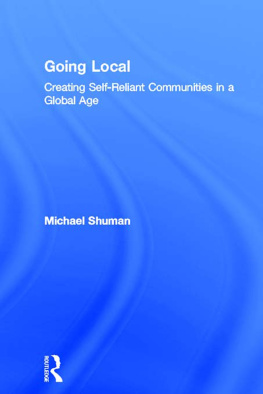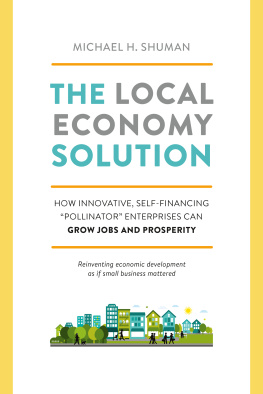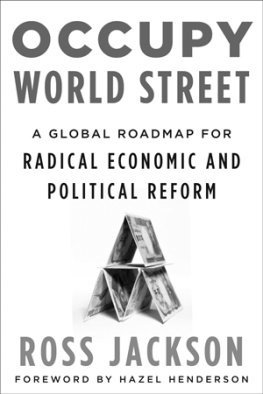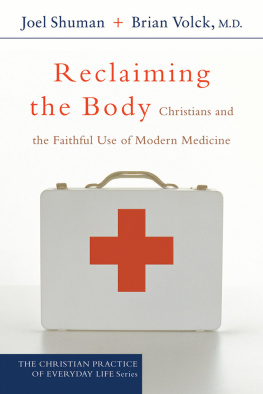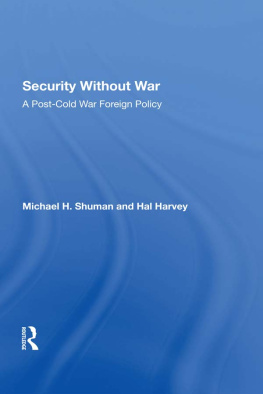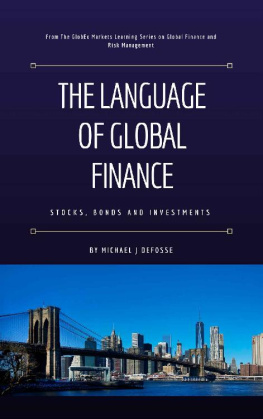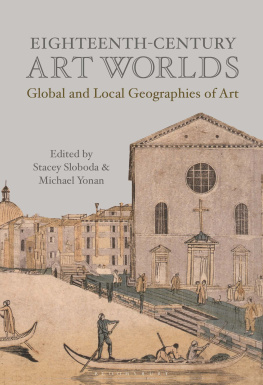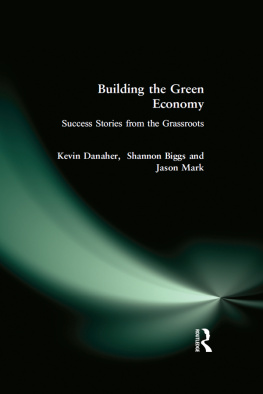More Praise forGoing Local
A great book on civic enterprise ... an essential addition to the urban bookshelf.
Sam Smith, author of the Great American Political Repair Manual
Going Local is on the short list of books for people serious about creating a positive future in their community. Easy to read, it offers ideas both inspiring and practical.
Michael Kinsley, Rocky Mountain Institute
If any community desired a handbook and a theoretical resource to support itself in its self-reliance vision, this is it.
Diane Fassel, in Social Policy
An impressive synthesis of current trends, policies, and initiatives into a rational agenda for building more sustainable local economies.
Robert Jaquay, in The Neighborhood Works
In this lively and fact-filled volume ... Shuman inspires us to envision a world in which what we buy supports rather than undermines our goals for a just, sustainable, and compassionate future.
Fran Korten, President, Positive Future Networks and Yes! Magazine
Thoughtful and imaginative proposals for making communities more economically and environmentally sustainable in the global marketplace.
Marc Weiss, Senior Fellow, Center for National Policy and former Special Assistant to the Secretary of HUD Henry Cisneros
Exciting, practical steps every city can take to nurture community-friendly businesses that enhance prosperity and security.
Larry Agran, former Mayor of Irvine, California
Published in 2000 by
Routledge
29 West 35th Street
New York, NY 10001
First published in hardcover in 1998 by The Free Press
and reprinted by arrangement with The Free Press.
First Routledge paperback edition, 2000
Routledge is an imprint of the Taylor & Francis Group.
Copyright 1998, 2000 by Michael H. Shuman
Printed in the United States of America on acid-free paper.
All rights reserved. No part of this book may be printed or reproduced or utilized in any form or by any electronic, mechanical or other means, now or known hereafter invented, including photocopying and recording, or in any information storage or retrieval system, without permission in writing from the publisher.
Library of Congress Cataloging-in-Publication Data
Shuman, Michael
Going local: creating self-reliant communities in a global age /
Michael H. Shuman.
p. cm.
ISBN 0-415-92768-4
1. Sustainable developmentUnited StatesCase Studies. 2. Free enterprise
United StatesCase Studies. 3. Community developmentUnited States
Case Studies. I. Title.
HC110.E5S491998
338.973dc21 97-27339
CIP
10 9 8
F OR D EBORAH
The real work of planet-saving will be small, humble, and humbling, and (insofar as it involves love) pleasing and rewarding. Its jobs will be too many to count, too many to report, too many to be publicly noticed or rewarded, too small to make anyone rich or famous.
WENDELL BERRY
CONTENTS
Acknowledgments
Going Local came about from what might be called an unexpected pregnancy. In July 1995, I sent Adam Bellow and Mitch Horowitz, editors at The Free Press, a book proposal concerning the emerging overlap between what many refer to, politically speaking, as left and right policies. They were particularly intrigued by a single paragraph of the proposal in which I suggested that progressives ought to transform their antipathy toward corporations into a principled commitment to create community-friendly businesses. Ultimately, Adam and Mitch offered a two-hook dealone based on the proposal and the other on the paragraphand insisted I write the second first. Aware that my bargaining power as an author was negligible, I only halfheartedly signed the contract. But whatever reservations I had about proceeding evaporated quickly when I realized that this project could enable me to pull together 15 years of organizing, thinking, and writing about community economics.
My involvement in local politics began shortly after I graduated from Stanford Law School in 1982, when I cofounded and then directed the Center for Innovative Diplomacy (CID). For nine years, CID built up a network of several thousand mayors and council members who were eager to influence international relations through initiatives like antiapartheid divestment, nuclear-free zones, sister cities with war-torn villages in Nicaragua and El Salvador, and stratospheric ozone-protection ordinances.
With a fellowship from the W. K. Kellogg Foundation in 1987, I tried to map out how these practitioners of municipal foreign policy could move beyond arms control and human rights, and into economic development. How, I wondered, could wealthier communities in the First World alleviate the poverty in most Third World megacities and villages? The best answers to this question were coming from a group called Towns and Development, a coalition of citizen groups, nongovernmental organizations, and elected officials based in The Hague, which was overseeing creative sister-city links among more than 4,000 communities worldwide. Towns and Development commissioned me to write an evaluation of their programs, and I put my findings in a book titled Towards a Global Village (London: Pluto, 1993). While generally enthusiastic about municipal North-South relationships, I also voiced reservations. I was particularly concerned that participants professed their dedication to creating sustainable communities, yet had no coherent vision of what the term meant.
The more that criticism sank in, the more I worried about continuing to work abroad. Were sister-city programs pushing southern partners down a path of free trade, economic growth, and modernization that would ultimately destroy their ecosystems, communities, and families? Did it make sense to promote programs to alleviate poverty abroad while we still had no coherent program for doing so at home?
And so began my search for the meaning of sustainable communities in the United States. In 1994, I wrote a paper on Reclaiming the Inner City for the Kellogg Foundation's Task Force on African-American Men and Boys, with supervision by and much encouragement from Bobby Austin. I began to collect stories about communities making strides toward economic self-reliance. Little of this good news, I discovered, reaches the mainstream press, and even the most innovative communities haven't a clue about what others may be doing down the road.
This book aims to weave these anecdotes into a larger story of how community development can succeed in an era of globalization. I promised myself at the outset not to shy away from taking positions that would challenge and shake up more than a few friends and colleagues, so let me assure readers that indeed few (if any) of the people listed below agree with all the ideas presented. However, nothing is better for sharpening a manuscript than tough critics, and in that spirit I'd like to thank:
Mitch Horowitz, the book's editor and father, who continually offered helpful editorial suggestions and encouragement;
Ron Goldfarb, agent extraordinaire;
various interns (Neil Allison, Meg Moga, and Rachel Gilliar) and research assistants (Marc Norman and Jenny Kassan), who have been true intellectual partners in the development of the ideas that follow;
the fellows of the Institute for Policy Studies (Gar Alperovitz, Sarah Anderson, Richard Barnet, Phyllis Bennis, Robert Borosage, John Cavanagh, Martha Honey, Saul Landau, and especially Marcus Raskin, whose project on Paths for the 21st Century sponsored this work);

